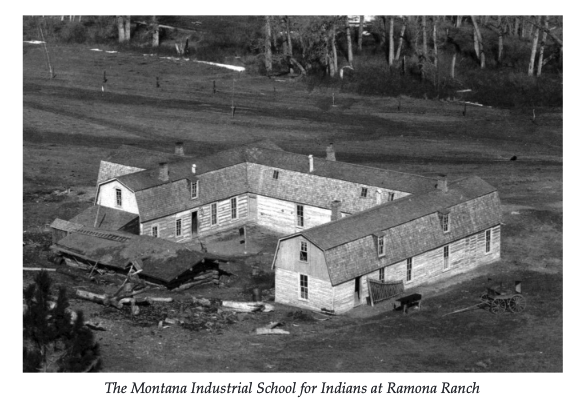The Unitarian Society, East Brunswick, NJ
November 21, 2021
Reverend Karen G. Johnston
Holding history. That is this month’s Soul Matters theme. This month is also Native American Heritage month. In just a few days most, if not all of us, will be celebrating Thanksgiving in some way, so it seems appropriate for us to explore holding history as it relates to indigenous communities of this continent and Native American peoples in our midst.
I have several asks at the beginning of today’s Sunday service and some at the end.
One is to full-heartedly engage with the beautiful music of the service, all of which was created and performed by indigenous musicians, the first hymn being the exception. I am thankful for the generosity these musicians extended us when I reached out to them with the request to use their music in the service. Of course, as is only right, we honored their request around compensation: one asked that he paid what we felt was right, one asked that we donate to a cause called the Seventh Generation Fund. And so we have.
My second ask is that you take in what you learned from our Time For All Ages story and find a way to integrate that, whether it was new information to you or not, into your holiday celebrations. I think this is especially important because it is the 400th anniversary of that first shared meal. If you begin your Thanksgiving meal with grace, can you find a way integrate the true story of Thanksgiving? Or perhaps you can find a way to offer a land acknowledgement? If there is time that you and loved ones spend in front of a screen, might you share the video with them, inviting a conversation about the distance between the true history and what we are taught in school and the implications of that. So that is my second ask.
My third ask is for us, as a congregation, to recognize that even though today’s worship service is focused on honoring indigenous communities, yesterday was Transgender Day of Remembrance in a year where we have seen the most violent deaths of trans folx, in a period of time where year after year, the number grows. My ask is that we continue to bring our attention to this congregation’s commitment to be truly welcoming, proactively protective, of our beloved trans members, friends, and neighbors.
~~~~
How we hold history, how we face the truth of it, is a strong indication of how we are doing when it comes to holding the truth of our present day. We see this when it comes to how our nation is doing with its latest transgression of history as some stoke the false controversy called Critical Race Theory. It sure does seem that there is a strong, recurring, insistent impulse towards historical erasure and minimization in the powerful and privileged in this nation. If we are to be true to our principles of justice and equity, we must resist whatever quality or quantity of this impulse we find in ourselves.
So, my fourth ask is to bring your full attention ~ head and heart ~ to the history I am about to share with you, for we Unitarian Universalists are not immune to that impulse to erase and minimize. Too often we have demonstrated that we prefer to hold the history of heroes, rather than the history of harm. Doing so does not help us build the diverse multi-cultural Beloved Community of which we dream. Doing so does not help us to accountably dismantle oppressions, as our 8th principle guides us to do.
When we hold our history with integrity, we learn the devastating chapter in North American history of Indian residential schools. We learn that Native children were forcibly removed from their families. We learn of schools with the philosophical and pedagogical motto was “kill the Indian, save the man.” We learn that we Unitarians were involved – that it was not just other Christian denominations. Not only did we financially supports the systems of these schools, we ran two of our own.
This past summer, it was basically impossible to avoid the reports of the discovery of graves of Native children discovered at residential schools in Canada. Over 1,300 unmarked graves at four former schools in western Canada shocked the world, but came as no surprise to First Nations communities, which have long held survivor stories of students digging graves for their classmates or rumors of children disappearing under suspicious circumstances.
Closer to home, in Carlisle, Pennsylvania, since 2017 and as recent as this summer, there have been returns of human remains with descendants of their families or tribes in the following indigenous communities: Rosebud Sioux, Alaskan Aleut, Northern Arapaho, Blackfeet, Oglala Sioux, Oneida, Omaha, Modoc and Iowa tribes.
This summer reopened wounds that have never healed, yet each return allows for the possibility. I think this is why it is so important to hold history with integrity: to allow for the possibility of both justice and healing.
Perhaps you are like me, somewhere between surprised and shocked, to hear that Unitarians had their own Indian residential schools. It is not something I learned as a lay person or in seminary. However, it had been duly, and often proudly, recorded in contemporary materials that Unitarians were involved in the establishment and management of a number of such schools in the 19th century, as well as taught at them, often understanding this as acts of service or social justice. According to Rev. Dana Stiver,
Early Unitarian writings indicate that many Unitarians propagated, or at least remained complicit in, the popular idea that westward expansion of the American frontier marked an advance of “civilization” over the “savagery” of Native peoples.
Rev. Samuel Atkins Eliot, president of the American Unitarian Association (AUA, the 19th century equivalent of the UUA), wrote this in his thesis at Harvard while preparing to become a Unitarian minister:
Indians as a race are inferior intellectually to white men. But this is not or should not be the object of Indian education to make Indian scholars. … We do not expect now from the Indian any contribution to national thought or character. …Indians must be taught to live properly before they can be taught to think and act with judgment and independence.
“The Montana Industrial School for Indians
at Ramona Ranch, 1886-1897″, Dana Capasso Stivers
When we hold history with integrity, we find that nearly or fully forgotten aspects begin to emerge. That is what has happened in the Unitarian Universalist universe. In 2007, delegates at General Assembly called for our faith movement to “uncover our links and complicity with the genocide of native peoples.” Out of that came it became more widely known that in 1870-1876, the AUA worked with the Ute Tribe in Colorado under the Grant Peace Policy and did so to “present to them the better phases of a Christian civilization.[i]”
In response to uncovering this aspect of our history, then UUA President William G. Sinkford (our first president of color, which is likely not a coincidence) used the occasion of the 2009 UUA General Assembly to offer a formal apology to the Ute tribe for Unitarians’ historical complicity in crimes and violence against the Ute people. The apology was accepted by a member of the Ute tribe.
This is not the only residential school we founded. There was also the Montana Industrial School for Indians at Ramona Ranch. It is sometimes referred to as the Bond Mission, so named after Rev. Henry Bond, who founded it with his wife, Pamela. They led it only for only the first few years that it operated, which was from 1886-1897.
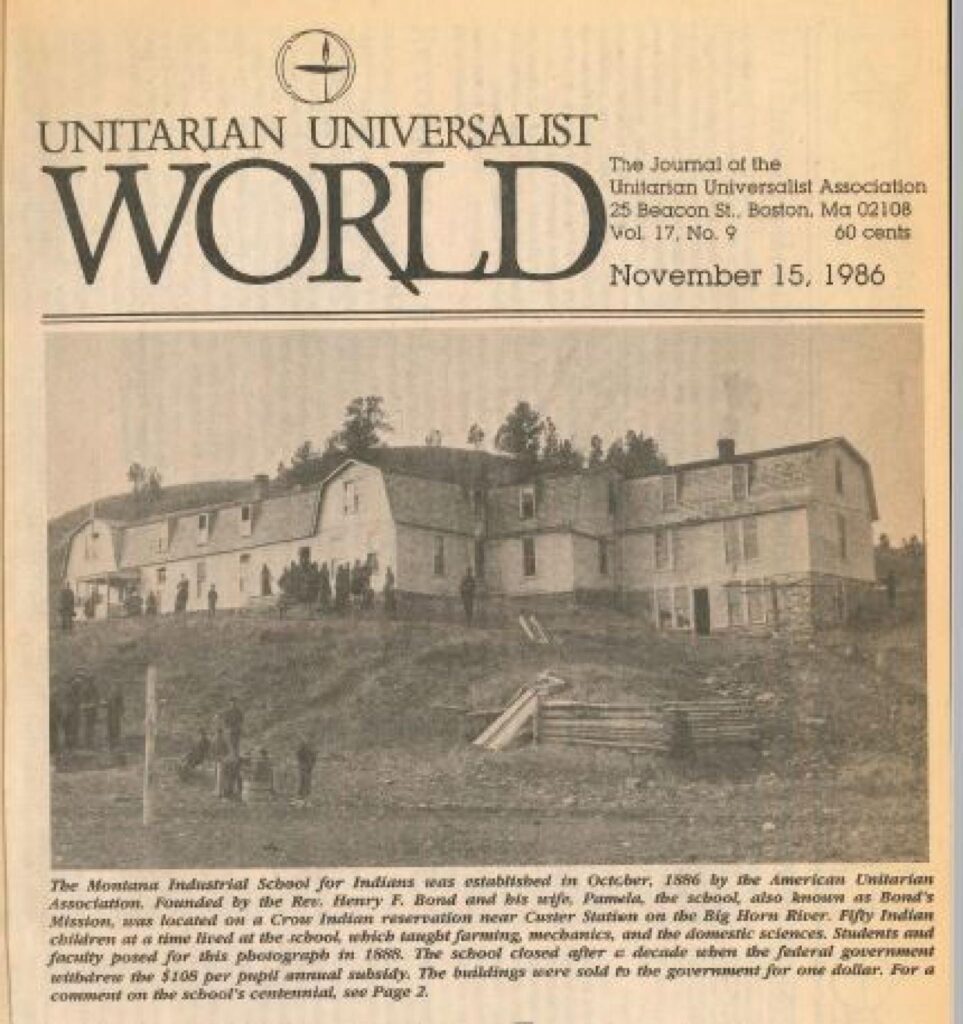
Divinity School, Cambridge, MA
The history of the Montana School, or the Bond Mission, is available to us because of Margery Pease, a member of the Crow Nation who is also Unitarian, self-published a history. She had a personal connection – one of her ancestors was one of the early Crow staff members of the school history. She knew the importance of holding this history and ensuring that others do the same. In 1986, she and her husband organized a centennial commemoration which descendants of students of the school attended, as well as the then president of the UUA, Bill Schultz. His remarks included these remarks:
If Henry and Pamela Bond were with us today, I am confident that they would say to the Crow community, “We who taught your parents and grandparents are now your students.”
I don’t know about you, but Schultz’ remarks strike me as rather saccharine revisionism or flat-out whitewashing, rather than holding history with integrity so that we might accountably dismantle systems of oppression.
We have access to a more detailed history of the Montana Industrial School because of a recent article by Rev. Dana Stivers in the Journal of Unitarian Universalist History. I am deeply indebted to this article, which greatly informs and enhances my understanding of this topic. In it, I learned how Rev. Bond meticulously tracked the enrollment of the school, as any good administrator should. Also, as any “good” white colonizer intent on assimilation, Rev. Bond noted not just the child’s Crow name, and their father’s name, but he gave each pupil an Anglicized name, by which they would be known going forward.
Though some Crow parents enrolled their parents willingly, there is clear evidence that others were coerced, with food rations withheld until they brought their child to the school.
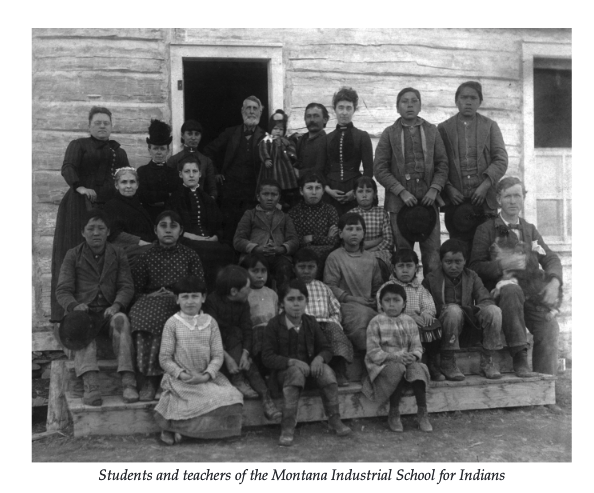
Divinity School, Cambridge, MA
Children at this school regularly ran back home. Including once when 17 boys all left on the same night. This only began to slow when Rev. Bond listened to one of his newly hired staff, a man whose mother was Crow and father was European. This staff member, George Pease, suggested that they build a dormitory for visiting parents. Once this was completed and families had a means to stay connected for meals or longer visits, the running away ebbed.
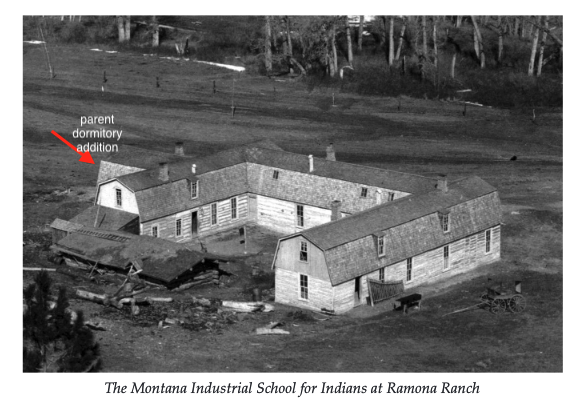
Divinity School, Cambridge, MA
This adaptation shows that over time, Rev. Bond was able to learn how to make the school into a less hostile environment, taking into account indigenous views on how to do better. Yet, as Stivers notes in the article:
Despite evidence of good intent and even expressions of love, we must recognize ultimately that the record reveals a painful picture. Crow youth were removed from their homes, at times against their will, as their running away attests. They were made to assimilate to Anglo-American ideals as the Unitarians worked to eliminate Crow language and culture.
“The Montana Industrial School for Indians
at Ramona Ranch, 1886-1897″, Dana Capasso Stivers
And so here we are. We know what we know and cannot unknow it. What do with do with this this history we are now holding?
At the start of the sermon I named four asks. For the end of the sermon I repeat one of them, and add a few:
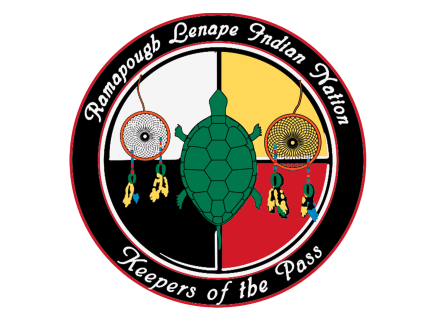
- Do find a way to integrate the true story of the origins of Thanksgiving into your holiday observance.
- Support our local indigenous communities, like our Be The Change recipient, the Ramapough Lenape Community Center
- Let me know if you would like to read Rev. Stivers’ article on the Montana Industrial School for Indians.
- Write to your Senators and Representative and voice your support for the Truth and Healing Commission on Indian Boarding School Policies in the U.S. Act, which the National Native American Boarding School Coalition supports. I’ll include information about it in next Wednesday’s weekly eblast.
May the coming Thanksgiving holiday, the 400th anniversary of the original shared meal between the Pilgrims and the Wampanoag, be more meaningful for you, given how we have spent our morning together today.
So be it. See to it. Amen.
~~~
Closing Words
Holding history is not some shriveled practice of paying attention to something long dead. Holding history is an enlivened and embodied dance of the then and the now, a recognition of the truth spoken by James Baldwin:
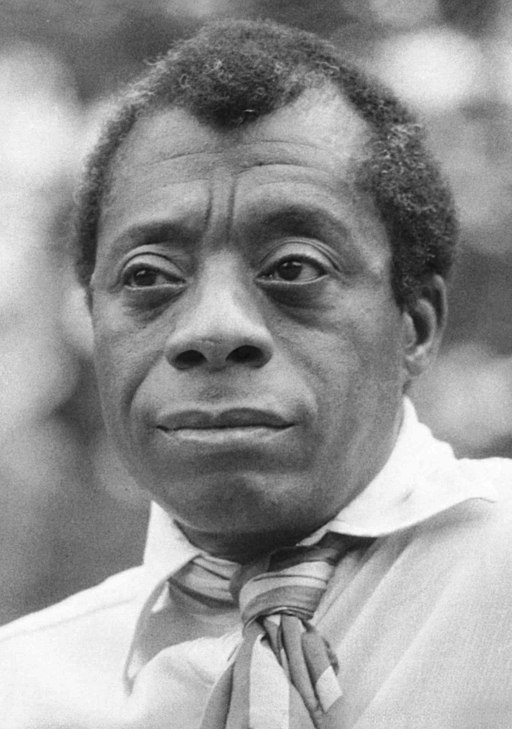
History is not the past.
It is the present.
We carry our history with us.
We are our history.
The truth of these words is like astronomical term, “dark matter”: we know history is there not so much because we can see it directly, but because we can see its influence on more knowable-to-us current events.
With what has happened this past week, while no one can tangibly point out white supremacy culture, we can see its influence on what we call the present, which echoes mightily of the past, so much so that they really and truly are one:
A teenage gun-toting white vigilante is pronounced not guilty of murder in the killing in Kenosha, Wisconsin, of two Black Lives Matters protestors in a courtroom awash with white privilege, claiming – as so many police officers do when killing unarmed people – that he feared for his life if he lost control of the very gun he brought into a chaotic situation.
This, while at the same time, in the trial of the three also gun-toting, also white, killers of Ahmaud Arbery, those three in a pick-up truck, those three who were chasing the young unarmed Black jogger, are using the same defense: they feared for their lives when Ahmaud defended himself by attempting to disarm the threatening strangers.
I speak of these recent events not to detract from today’s sermon focused on honoring indigenous communities. I raise our attention to these because the white supremacy culture at the source of this violence is the same white supremacy culture at the source of the disenfranchisement of indigenous communities, of Native peoples: chattel slavery of Africans and the genocide of the indigenous peoples of this continent.
They are not in competition with one another for our attention. They call out to all of us to see how this past continues to contort our present, keeping the values we cherish so much that we name them in our principles — justice, equity, compassion, peace – from full fruition. Keeping at bay our dreams of a diverse multi-cultural Beloved Community which aims to accountably dismantle all forms of oppression.
***
As the service comes to a close, let these three questions be your company in the days and weeks to come:
What do our Unitarian Universalist covenants demand of us as we hold history knowing it is not past, affirming that it is present as we carry it with us, in us?
How do our spiritual practices change as we hold history knowing it is not past, affirming that it is present as we carry it with us, in us?
Our day-to-day choices, mundane habits and intentional actions: what do we make of them as we hold history knowing it is not past, affirming that it is present as we carry it with us, in us?
[i] 1877 AUA Yearbook
